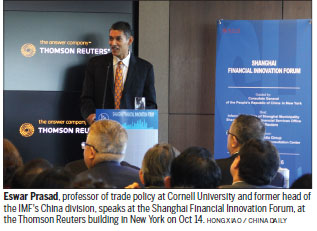If any city in the world knows about change, it's Shanghai. But it could be just getting started.
Shanghai is accelerating its building of an international financial center and development of the Free Trade Zone in accordance with national strategy, experts say.
The city is also creating itself as an innovation center with global influence, assisting the restructuring of China's economy.
Chinese officials and US financial experts gathered in New York for the Shanghai Financial Innovation Forum at the Thomson Reuters building on Oct 14 to talk about ways to expand Shanghai's role as a hub for financial innovation.
Wu Jun, deputy director general of Shanghai's municipal financial services office, said there was still a large gap between Shanghai as a developing international financial hub, and New York, in terms of the demands of marketization, internationalization and legalization.
Further improvement demands more effort from the aspects of facilitating the cross-border use of RMB and taking advantage of the China (Shanghai) Pilot Free Trade Zone (FTZ), he said.
According to the Xinhua-Dow Jones International Financial Centers Development Index (IFCD Index), Shanghai ranks No 6 and New York No 1 in 2013 and 2014 consecutively, an indication that Shanghai has made great progress but still has long way to go, Wu said.
In the first eight months of 2016, the total amount of Shanghai's cross-border settlement RMB equaled $1.5 trillion, Wu added, and the RMB continued to maintain its position as the fifth-most important payment currency, its market share reaching 1.86 percent in August.
Wang Xinkui, chairman and president of Shanghai Affairs Consultation Center, said the establishment of the Pilot FTZ three years ago marked a new stage in China's opening up.
By drawing upon the experiences of the previous three years, Wang suggested that China's Pilot FTZ focus on resolving major problems like the contradictions between the administration mode of using the zone as a special control and the practical needs of expanding and opening up to the outside world in the services industry.
On Oct 1, the RMB became a member of the International Monetary Fund (IMF) Special Drawing Rights (SDR) basket and accounts for 10.92 percent of the basket, following the US dollar's 41.73 percent and the euro's 30.93 percent.
Eswar Prasad, senior professor of trade policy at Cornell University and former head of the IMF's China division, talked about the potential domestic and global impact of the internationalization of the RMB in connection with his new book, Gaining Currency: The Rise of the Renminbi (Oxford University Press, 2016).
"Over the next few years, the RMB's rising importance in international finance could well serve as a catalyst for domestic reforms and also help in improving the stability of the international financial system," he said.
Prasad said that the key challenge that China now faces in promoting its currency's international role is that it needs well-developed and better-regulated financial markets.
He said the Chinese government is taking some of the necessary steps, trying to develop and strengthen its corporate and government bond markets, while also giving foreign investors easier access to such instruments.
xiaohong@chinadailyusa.com

